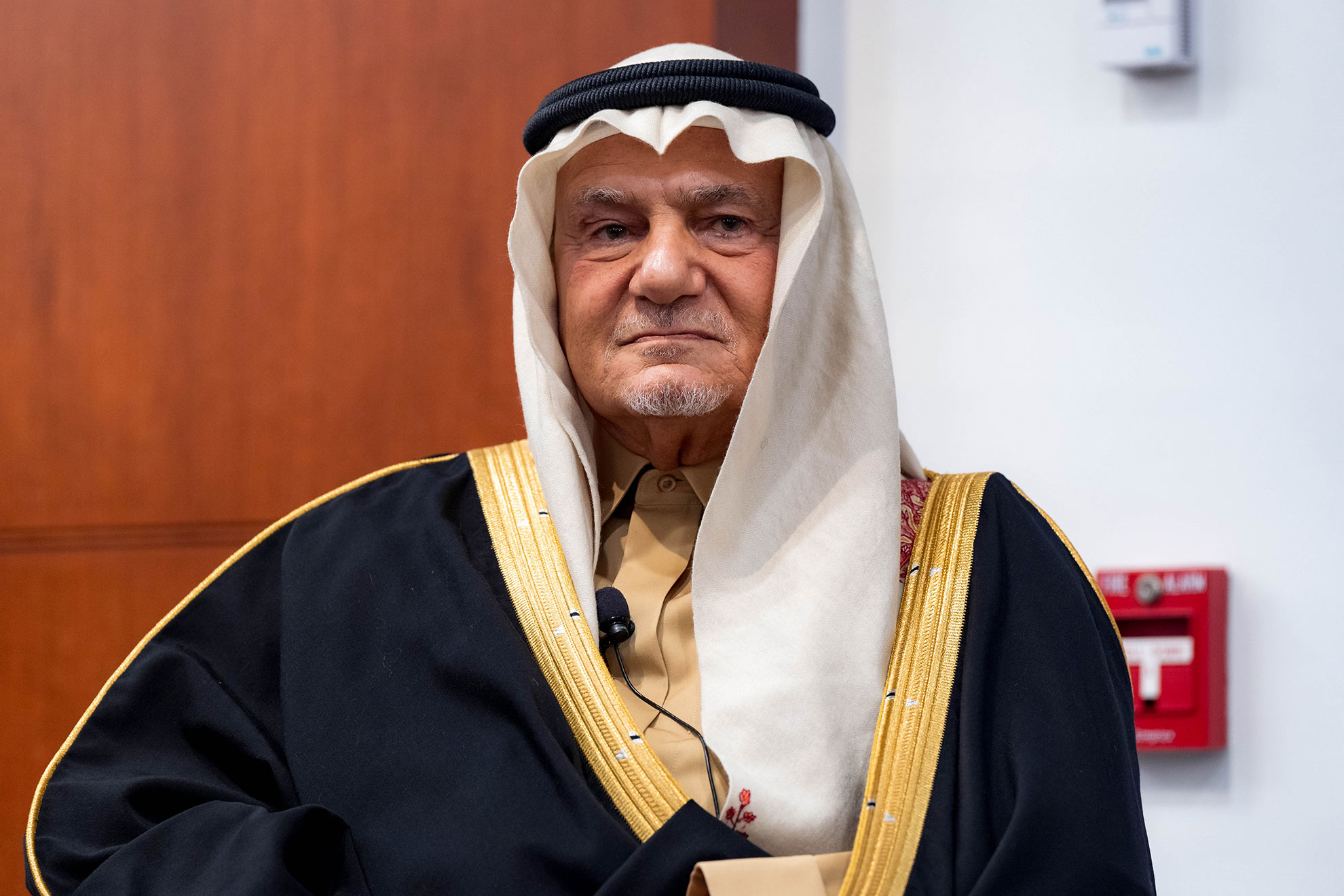A former Saudi Arabian intelligence chief called international inaction in Gaza “criminal” and called on Israel’s sophisticated military to employ more targeted methods to reduce civilian deaths in a conflict that has killed tens of thousands.
“What we need there is for both sides — not just the Israelis but also the Arabs — to say enough is enough and to turn to wiser heads and more capable leadership around the world to bring an end to the cycle of tit for tat and death for death and destruction for destruction,” said His Royal Highness Prince Turki Al Faisal, who served for 24 years as head of the Saudi Arabian Intelligence Presidency before stepping down in 2001.
Al Faisal, current chair of the King Faisal Center for Research and Islamic Studies in Riyadh, also proposed a U.N.-brokered process for a two-state solution during the Middle East Initiative’s “Middle East Dialogues” last Thursday at the Harvard Kennedy School. Hosted by Tarek Masoud, the initiative’s faculty chair, the series brings prominent actors from across the Middle East to discuss the war in Gaza and broader regional issues.
“This is something we began at Harvard last year to bring to this University genuine, candid, open conversations with people who hold wildly varied but widely shared views on the conflict between Israel and Palestine, the causes of that conflict and how it might be brought to an end,” said Masoud, who is also the Ford Foundation Professor of Democracy and Governance, as he introduced the event, the first of this school year.
Al Faisal, a member of the Saudi royal family and former ambassador to the U.S. and U.K., said that Hamas — whose Oct. 7, 2023, attack on Israel sparked the war — is a terrorist group, but argued that if Hamas mingles with civilians and digs tunnels under hospitals and mosques, Israeli soldiers should fight in the tunnels, not bomb indiscriminately.
Al Faisal called for establishment of a Palestinian state with its capital in Jerusalem to resolve the conflict as part of the creation of a two-state solution, with talks guided by the United Nations and participation of global powers.
“Part of the U.N. setup would be an article to come out in the United Nations Security Council resolution barring anybody on the side of the Palestinians and Israelis who does not accept a two-state solution from being in negotiations for a two-state solution,” Al Faisal said, adding that that would include even major players like Hamas and Hezbollah. “A mechanism should be put in place to get only those committed to the principle of peace between Arabs and Israelis to be party to the negotiations.”
Masoud described Al Faisal as “one of the broadest minds in our region, if not our planet” and as “not just a witness to history, but a shaper of it.”
Despite repeated calls for peace, the war has killed an estimated 45,000 civilians and displaced hundreds of thousands. It has expanded in recent months into southern Lebanon after Iran-backed Hezbollah repeatedly fired rockets into Israel. Concerns about the war widening further have risen as Israel and Iran exchanged rocket fire.
In response to Masoud’s questions, Al Faisal said the ongoing fighting is planting seeds of anguish and anger among today’s children in Gaza. Those seeds will fuel the continuation of the long-running cycle of violence that has plagued the region.
“My view is even one death on both sides is not worth the destruction that is taking place,” Al Faisal said. “There is a verse in the Quran which says, ‘The killing of an innocent person is like killing all mankind.’ That is the attitude I think a state with the recognition that Israel has in the world should take into consideration.”
Al Faisal also addressed Saudi Arabia’s approach to relations with Israel, saying normalization by other nations like Egypt and Jordan has had no impact on the fighting, so Saudi Arabia shouldn’t pursue it until the fighting has concluded, and a Palestinian state is assured.
Asked why Saudi Arabia hasn’t responded as it did to U.S. support for Israel in the 1973 Arab-Israeli War, when it imposed a painful oil embargo, Al Faisal said that times have changed. Such an approach today would be ineffective, he said, largely because the U.S. has become a major oil-producing nation.
Prior speakers in the Dialogues series included Jared Kushner, former senior adviser to former President Donald Trump; Matt Duss, executive director of the Center for International Policy and former foreign policy adviser to Vermont Sen. Bernie Sanders; Salam Fayyad, former prime minister of the Palestinian Authority; and Einat Wilf, a political scientist and former member of the Knesset.
Al Faisal also addressed broader issues outside the conflict and praised the recent loosening of cultural rules in the kingdom and its more welcoming approach to outsiders. He also said there are opportunities for the U.S. and Saudi Arabia to cooperate more. Saudi Arabia is a significant provider of international aid, he said, and together the two could make a difference on international poverty.
“We are an evolving country, like all countries are,” Al Faisal said. “It’s not going to be a matter of a top-down decree on what to do, but rather an integration of the sense of what people want and what leadership can provide them.”
Source link

